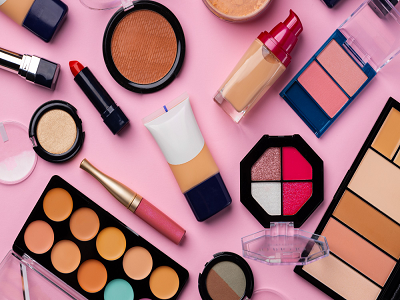
In 2022, the global cosmetics market was valued at USD 262,210 million. At present beauty industry is experiencing upward traction which is proven to be resilient through the Covid-19 pandemic. The cosmetics market is foreseen to continue at this pace in the future and is projected to cross a valuation of USD 367,687 million by 2030. Demand for personal care is coupled with animal concerns expected to bring more cruelty-free cosmetic products on shelves.?
- The Insight Partners
The glowing cosmetics market has attracted many new companies and investors. Consumer's emphasis on looking and feeling good has led to a changing landscape of the global cosmetics market. Spur in the shift towards cosmetic brands is attributed to the evolving significance of self-care. Brands taking differentiated stands to find success in this competitive market. Premiumization is expected to grow as consumers are trading and spending on makeup and fragrances. Both venture capitalists and investors have benefitted from expanding the cosmetics market. As new brands are coming forth, the cosmetics market is bound to grow faster than ever before. Especially post-pandemic COVID-19, cosmetics market participants quickly captured changes in consumer behavior and renovated their products and appeal. As per a survey conducted by McKinsey in 2023 across China, France, Italy, Germany, the UK, and the US, about 42% of participants responded that they look for new brands while shopping for cosmetics. This signifies consumers' willingness towards new cosmetic companies. As the concept of beauty and awareness of products continuously evolving, companies need to put their innovation game on with the hope of winning new customers.Altering Consumer Perceptions, Intensified Competition in Cosmetics Market
The dynamic cosmetic arsenal is being reshaped through increasing product arrays, and channels. Changing perceptions of younger consumers about the definition of beauty and sustainability influence setting the ground for cosmetics brands. Over time cosmetic landscape has become competitive with independent brands coming up with new challenges. Rising competition is pushing brands to opt for trend-driven dynamics. The price-conscious behavior of consumers reportedly influences online as well as offline channels. The Insight Partners estimates, the next decade to be crucial for cosmetics market participants, both in terms of unlocking new revenue channels and maintaining a competitive edge. The market is expected to attract new investors with new opportunities. However, there is limited space on cosmetic pallets. Companies offering disruptive propositions are most likely to report their wellbeing on the top.?Disruptive cosmetics market trends, what do they have for brands?
Hyper-Personalization
Gone are the days when one had to test a range of cosmetics before picking one that suits the most. Brands have taken a step ahead with hyper-personalization. As makeup and personal care never go out of style, this industry is most suitable from investors' perspective.Hyper-personalization is reflected through premium skincare products offered by brands to satisfy consumer needs. Companies use consumer information such as hair type, skin tone, and even products used to tweak ingredients to form customized offerings. Brands offering anti acne cleansers, menopause products, and men's cosmetics are targeting specific customer niches. Certainly, these brands are not targeting mass customers instead they are enhancing domain expertise to gain consumer trust."Cosmetics market players that are working on specific consumer needs are likely to be rewarded by a loyal consumer base and pioneer's profit"
Sustainable Biotech Innovations
The cosmetics market is facing high competition that rising every day. The growing need for eco-friendly products has gained traction in the cosmetics market. Consumers seek quality products and stand for environmental causes. Consumer behavior research found that customers are willing to pay extra for cruelty-free and vegan products. Plant-based products are gaining lucrative attention from customers coupled with the trend of veganism. Reusable packaging and paraben-free products are being demanded by consumers forcing brands to innovate their offerings. Growing concerns about climate and animal testing have built real pressure on brands to be part of this global sustainability discussion.Brands are competing for dominance over each other. With consumers supporting sustainable brands, cosmetics market companies will consistently face the pressure of innovation and rethinking of product packaging.? It also depends on how the brand conveys its initiatives to customers."Brands investing in clean products are foreseen to stay relevant in the long term"
Plant-based and Cruelty-free cosmetics market
There has been a noticeable shift in consumers' preference for products catering to specific needs. Consumers are seeking more information before they make decisions to buy from brands. Escalating consumer education on cosmetic products is reflected in their choices. Companies can capture the gap in the market by following a no one size fits all? approach where different ingredients can be used to cater to desired outcomes. More customers embracing natural anti-aging ingredients in cleansers, moisturizers, and conditioners. Plant-based cosmetics are formed using plants in optimal concentrations to offer maximum benefits. As plant-based cosmetic products don't support animal testing hence considered cruelty-free. Many countries ban animal testing of cosmetics ingredients on animals. India was the first to begin in the Asia Pacific region. Increasing the spotlight on animal consciousness and improved self-education led to innovation in alternative ways of testing. Leading cosmetic industry experts are developing products free from animal testing methods. Brands listed by PETA US to carry animal test-free certificates are good to consider cruelty-free cosmetics. Beauty without bunnies? a database provided by PETA consists of a list of companies that do or don't test their products on animals, generating consumer awareness. Brands keeping transparency in their communication and practicing the values likely to retain consumer trust."Cruelty-free cosmetics market is foreseen to take upward traction in the coming decade due to conscious consumerism"
Social Media Marketing - Inclusive Advertisements
Beauty and cosmetic industry were among the pioneering adopters of social media in marketing. As cosmetic companies have to reserve large budgets for marketing, companies turned towards the use of social media. Effective marketing can be a crucial factor in both the failure and success of cosmetics market players.? The demand for anti-aging cosmetics is foreseen to increase in parallel to the desire for aesthetics driven by social media consciousness. Engagement wasn't a new concept for cosmetic companies. But it evolved to become better through social media. Companies can analyze the number of likes, shares, and comments on their social media posts. If these metrics are not satisfying companies need to analyze their entertainment content on media. Often entertainment and engagement both result in rising sales. Short stories and videos are appealing ways to increase sales of brands.Influencer marketing is trending in this arsenal as brands form an association with reliable faces to give consumers a sense of confidence in products. Based on prior experience and consumer reviews, customers choose to repeat purchases"A strong presence on social media creates a sense of high prestige for cosmetic companies"







